新人教新目标版八年级英语下册Unit1What’sthematter短语语法知识点汇总
人教版初二(下)英语unit1 what's the matter知识点讲解与练习
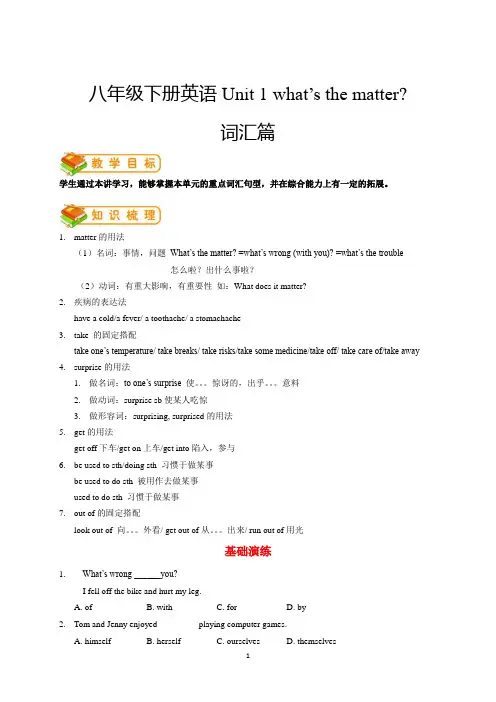
八年级下册英语Unit 1 what’s the matter?词汇篇学生通过本讲学习,能够掌握本单元的重点词汇句型,并在综合能力上有一定的拓展。
1.matter的用法(1)名词:事情,问题What’s the matter? =what’s wrong (with you)? =what’s the trouble怎么啦?出什么事啦?(2)动词:有重大影响,有重要性如:What does it matter?2.疾病的表达法have a cold/a fever/ a toothache/ a stomachache3.take 的固定搭配take one’s temperature/ take breaks/ take risks/take some medicine/take off/ take care of/take away 4.surprise的用法1.做名词:to one’s surprise 使。
惊讶的,出乎。
意料2.做动词:surprise sb使某人吃惊3.做形容词:surprising, surprised的用法5.get的用法get off下车/get on上车/get into陷入,参与6.be used to sth/doing sth 习惯于做某事be used to do sth 被用作去做某事used to do sth 习惯于做某事7.out of的固定搭配look out of 向。
外看/ get out of从。
出来/ run out of用光基础演练1.---What’s wrong ______you?---I fell off the bike and hurt my leg.A. ofB. withC. forD. by2.Tom and Jenny enjoyed _________playing computer games.A. himselfB. herselfC. ourselvesD. themselves3. Sally became interested ___________science and wanted to be a scientist.A. forB. inC. throughD. at4. ---I had a __________.---You’d better go to see a dentist.A. headacheB. feverC. coldD. toothache5. I didn’t _________my temperature, but I knew I had a fever.A. giveB. setC. takeD. show二、根据汉语意思翻译句子。
八年级英语下册Unit1What’sthematter知识点整合新版人教新目标版【word版】.doc
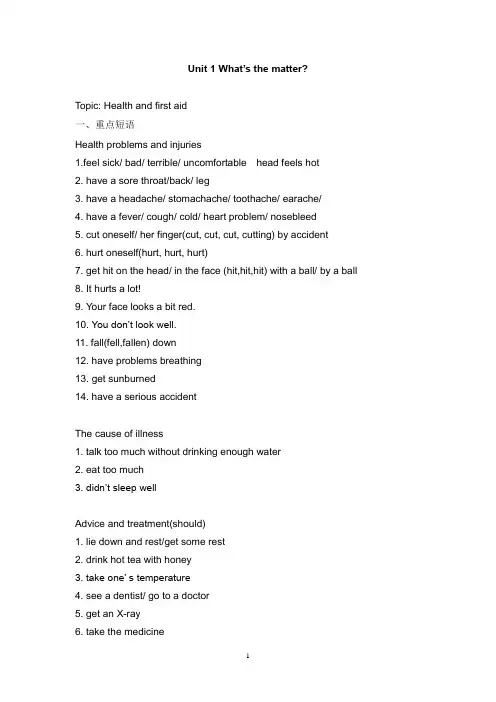
Unit 1 What’s the matter?Topic: Health and first aid一、重点短语Health problems and injuries1.feel sick/ bad/ terrible/ uncomfortable head feels hot2. have a sore throat/back/ leg3. have a headache/ stomachache/ toothache/ earache/4. have a fever/ cough/ cold/ heart problem/ nosebleed5. cut oneself/ her finger(cut, cut, cut, cutting) by accident6. hurt oneself(hurt, hurt, hurt)7. get hit on the head/ in the face (hit,hit,hit) with a ball/ by a ball8. It hurts a lot!9. Your face looks a bit red.10. You don’t look well.11. fall(fell,fallen) down12. have problems breathing13. get sunburned14. have a serious accidentThe cause of illness1. talk too much without drinking enough water2. eat too much3. didn’t sleep wellAdvice and treatment(should)1. lie down and rest/get some rest2. drink hot tea with honey3. take one’ s temperature4. see a dentist/ go to a doctor5. get an X-ray6. take the medicine7. wash the cut and put some medicine on it/ put a bandage on it8. press the sides of the noseOthers1. the other day2. an all-you-can-eat meal3. at first4. take good care of5. all weekend6. take breaks/ a break away from the computer7. sit in the same way for too long without moving( sit,sat, sat, sitting)8. on the side of the road9. shout for help10. without thinking twice11. get off/on12. act quickly13. most of the passengers14. wait for the next bus15. to one’s surprise16. move the man onto the bus17. thanks to18. get into trouble19. save a life20. right away21. in time22. help others23. hurt oneself playing soccer25. a few days26. as a mountain climber27. be interested in28. take risks29. in a vey dangerous situation30. by oneself31. run out (of)32.cut off half his right arm33. lose too much blood(lose-lose-lost)34. a book called Between a Rock and a Hard Place35.the importance of36. make good decisions37.in control of38. the love for39. the same spirit40.because of41. give up二、重点句型1. see sb doing sth/ do sth2. expect sb to do sth3. agree to do sth4. think about doing sth5. tell sb. To do sth (tell, told, told)6. be used to doing sthused to do sthbe used to do sth7. be ready to do sth/for sth8. keep on doing sth三、词形变化1. press (v.)---pressure (n.)2. lie-lay-lay lying3. surprise (v./n.) ----surprised(adj.) ----surprising(adj.)4. agree(v.)---agreement(n.)5. breath(n.)---breathe(v.)6.interest (n.) ---intersted(adj.)---interesting (adj.)7. excite( v.)---exciting, excited(adj.)---excitement(n.)8. danger(n.)---dangerous(adj.) ----endangered(adj.)9. importance (n.)---important(adj.)10 decide(v.)---decision (n.)11. die(v. ) ----dead(adj.) --- death(n.)四、好句赏析1. I couldn’t get myself out of bed this morning.2. He was taken to the hospital to get an X-ray.3. The bus driver, 24-year-old Wang Ping, stopped the bus without thinking twice.4. Do you agree that people often don’t want to help others because they do not want to get into trouble?5. Aron Ralston is an American who is interested in mountain climbing.(climbing mountains).6. this is one of the exciting things about doing dangerous sports.7. On that day, Aron’s arm was caught under a 360-kilo rock that fell on him when he was climbing by himself in the mountains.8. This means being in a difficult situation that you cannot seem to get out of.9. Aron tells of the importance of making good decisions and of being in control of one’s life.10. His love for mountain climbing is so great that he kept on climbing mountains even after this experience.At 9:00 a.m.yesterday,bus No.26 was along Zhonghua Road when the driver saw an old man on the side of the road.A woman next to him was shouting help.The bus driver,24-year-old Wang Ping, stopped the bus without thinking .He got off and asked the woman what happened.She said that the man had a heart problem and should go to the hospital Mr.Wang knew he had to act .He told the passengers that he must take the man to the hospital.He most or all of the passengers to get off and wait for the next bus.But to his ,they all agreed to go with him. Some passengers helped Mr.Wang to move the man on the bus.to Mr.Wang and the passengers,the doctors saved the man in time. “It’s sad that many people don’t want to help because they don’t want any trouble,” says one passenger.“But the driver didn’t think about himself. He only thought saving a life.”Aron Ralston is an American man who is interested in mountain climbing. As a mountain climber, ARon is used to taking . This is one of the exciting about doing dangerous sports. There were many times when Aron almost lost his life because of accidents. On April 26,2003,he himself in a very dangerous situation when climbing in Utah.•On that day, Ron’s arm was under a 360-Kilo rock that fell on him when he was climbing by in the mountains. Because he could nothis arm, he stayed there for five days and hoped that someone would find him. But when his water ran out, he knew that he would have to do something to save his own life. He wasn’t to die that day.So he used his knife to cut half his right arm. Then with his left arm, he bandaged himself so that he wouldn’t lose too much blood. After that, he climbed down the mountain to find help,•After his arm, he wrote a book called Between a Rock and Hard Place. This means being in a difficult situation that you can’t seem to get out of. In this book, Aron tells of the of making good decisions, and of being in control of one’s life.His love for mountain climbing is so great that he kept on climbing mountains even after this experience.•Do we have the same spirit as Aron? Let’s think about it before we find ourselves “between a rock and a hard place”, and before we have to make a decision that could mean life or death.。
新目标英语8下一单元Unit-1-What’s-the-matter重点语法详解与重点短语
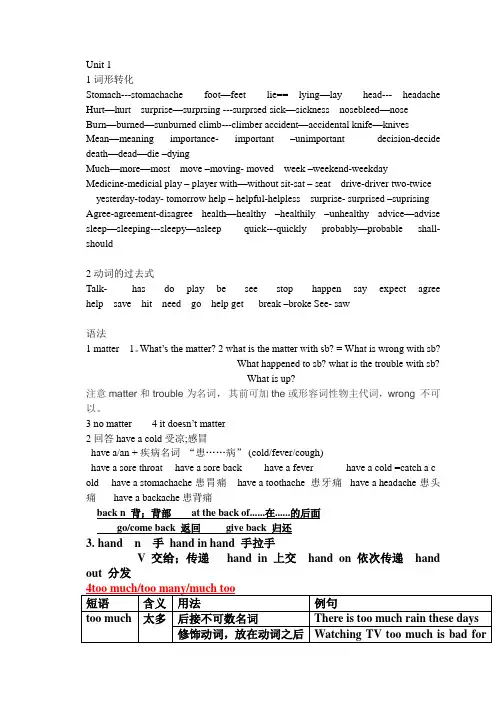
Unit 11词形转化Stomach---stomachache foot—feet lie== lying—lay head--- headache Hurt—hurt surprise—surprsing ---surprsed sick—sickness nosebleed—nose Burn—burned—sunburned climb---climber accident—accidental knife—knives Mean—meaning importance- important –unimportant decision-decide death—dead—die –dyingMuch—more—most move –moving- moved week –weekend-weekdayMedicine-medicial play – player with—without sit-sat – seat drive-driver two-twice yesterday-today- tomorrow help – helpful-helpless surprise- surprised –suprising Agree-agreement-disagree health—healthy –healthily –unhealthy advice—advise sleep—sleeping---sleepy—asleep quick---quickly probably—probable shall- should2动词的过去式Talk- has do play be see stop happen say expect agree help save hit need go help get break –broke See- saw语法1 matter 1。
What’s the matter?2 what is the matter with sb? =What is wrong with sb?What happened to sb? what is the trouble with sb?What is up?注意matter 和trouble 为名词,其前可加the 或形容词性物主代词,wrong 不可以。
Unit1 What's the matter 短语总结-背诵版
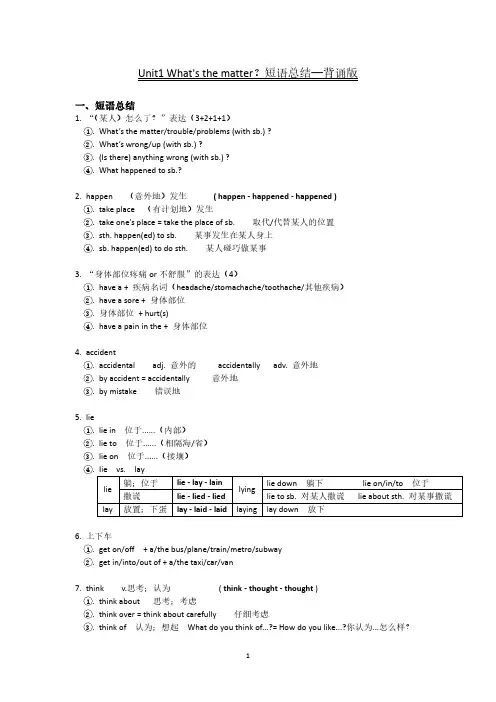
Unit1What's the matter?短语总结—背诵版一、短语总结1.“(某人)怎么了?”表达(3+2+1+1)1.What’s the matter/trouble/problems(with sb.)?2.What’s wrong/up(with sb.)?3.(Is there)anything wrong(with sb.)?4.What happened to sb.?2.happen(意外地)发生(happen-happened-happened)1.take place(有计划地)发生2.take one’s place=take the place of sb.取代/代替某人的位置3.sth.happen(ed)to sb.某事发生在某人身上4.sb.happen(ed)to do sth.某人碰巧做某事3.“身体部位疼痛or不舒服”的表达(4)1.have a+疾病名词(headache/stomachache/toothache/其他疾病)2.have a sore+身体部位3.身体部位+hurt(s)4.have a pain in the+身体部位4.accident1.accidental adj.意外的accidentally adv.意外地2.by accident=accidentally意外地3.by mistake错误地5.lie1.lie in位于......(内部)2.lie to位于......(相隔海/省)3.lie on位于......(接壤)4.Iie ylie躺;位于lie-lay-lain lying lie down躺下lie on/in/to位于撒谎lie-lied-lied lie to sb.对某人撒谎lie about sth.对某事撒谎lay放置;下蛋lay-laid-laid laying lay down放下6.上下车1.get on/off+a/the bus/plane/train/metro/subway2.get in/into/out of+a/the taxi/car/van7.think v.思考;认为(think-thought-thought)1.think about思考;考虑2.think over=think about carefully仔细考虑3.think of认为;想起What do you think of...?=How do you like...?你认为...怎么样?4.think twice再三考虑;谨慎考虑8.surprise n./v.(surprise-surprised-surprised)1.to one’s surprise令某人吃惊的是2.in surprise=surprisingly吃惊地3.be surprised at对......感到吃惊4.be excited about对......感到激动5.be interested in对......感兴趣9.trouble n.麻烦(不可数)1.have trouble/problems/difficulty(in)doing sth.做某事有麻烦/问题/困难2.get into trouble陷入麻烦3.be in trouble在麻烦中10.fall v./n.(秋天)(fall-fell-fallen)1.fall behind sb.落后某人catch up with sb.赶上某人2.fall in love with sb./sth.爱上...../与......相爱3.fall down掉下4.fall over摔跤5.fall down from...=fall off...从......掉下6.fall asleep睡着11.run v.跑/经营(run-ran-run)1.run after...追赶...2.run away逃跑3.sb.run out of sth.某人用光/耗尽某物4.sth.run out某物花光/耗光5.run a shop/company/restaurant经营一家商店/公司/餐馆e n./v.使用(use-used-used)1.be useful=be of use有用的2.be useless=be of no use没有用的3.be used to(doing)sth.习惯于(做)某事4.be used to do sth.被用来做某事ed to do sth.过去常常做某事13.help n./v.帮助(help-helped-helped)1.help(sb.)to do sth.帮助某人做某事2.help sb.with sth.在某方面帮助某人3.can’t help doing sth.情不自禁/忍不住做某事4.help oneself to sth.自便/自取......(随便吃/喝......)5.with one’s help=with the help of sth.在某人的帮助下6.ask sb.for help=turn to sb.向某人寻求帮助14.own adj.自己的v.拥有(own-owned-owned)owner n.拥有者1.sb.own sth.=sb.be the owner of sth.某人拥有某物2.on one’s own=by oneself=alone独自地3.one’s own+n.(单/复)某人自己的......15.mean v.意思是/打算(mean-meant-meant)adj.刻薄的;吝啬的meaning n.意思;意义meaningful adj.有意义的meaningless无意义的1.mean to do sth.打算做某事2.mean doing sth.意味着做某事16.mind v.介意/在意(mind-minded-minded)n.决心;心智;思想;头脑1.make up one’s mind(to do sth.)下定决心(做某事)2.change one’s mind改变某人的主意3.keep......in mind记住......4.lose one’s mind失去理智;发疯5.in one’s mind=in one’s opinion=in one’s view在某人看来6.mind sb./one’s doing sth.介意某人做某事7.Never mind.(用于安慰)没关系;别担心;不要紧17.cut v.切割/砍(cut-cut-cut)1.cut up=cut...into pieces切碎2.cut off切掉3.cut down砍倒4.cut...in half对半切开18.keep v.保持;继续(keep-kept-kept)1.keep doing sth.保持做某事2.keep sb.doing sth.让某人保持做某事3.keep on doing sth.=go on doing sth.继续做某事4.keep/stop sb.from doing sth.阻止某人做某事19.risk(risk-risked-risked)1.be at risk=be in danger有危险的/在危险中2.take a risk=take risks冒险3.take the risk of sth.=be at the risk of sth.冒着......的风险4.risk doing sth.冒险做某事20.expect v.期待(expect-expected-expected)1.expect(sb.)to do sth.期待(某人)做某事2.expect that从句期待+宾语从句21.sick adj.生病的(定语、表语)ill adj.生病的(只作表语)1.sick-sicker-sickest ill-worse-worst2.be sick of sth.厌烦某事3.be tired of sth.厌倦某事22.breath n.呼吸breathe v.呼吸(breathe-breathed-breathed)1.breathe fresh air呼吸新鲜空气2.hold one’s breath屏住呼吸3.take a deep breath深呼吸4.be out of breath上气不接下气23.ready adj.准备好的1.get/be ready to do sth.准备好做某事2.get/be ready for sth.为......做好准备24.其他短语1.be in control of sth.控制/掌管/管理某事2.take one’s temperature量某人的体温3.take the medicine吃药take pills吃药片4.the rest of sth./sb.剩下的某物/某人5.right away=right now=at once立刻;立即;马上6.get out of...从......出来/离开......。
人教八年级下册 Unit 1 What’s the matter 短语归纳
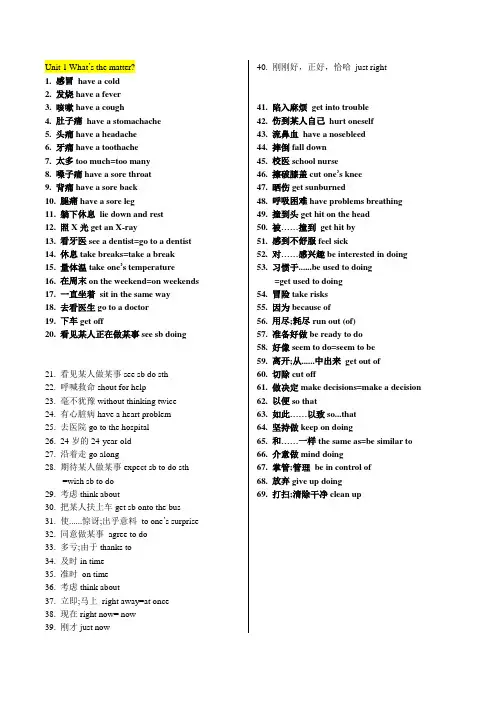
Unit 1 What’s the matter?1. 感冒have a cold2. 发烧have a fever3. 咳嗽have a cough4. 肚子痛have a stomachache5. 头痛have a headache6. 牙痛have a toothache7. 太多too much=too many8. 嗓子痛have a sore throat9. 背痛have a sore back10. 腿痛have a sore leg11. 躺下休息lie down and rest12. 照X光get an X-ray13. 看牙医see a dentist=go to a dentist14. 休息take breaks=take a break15. 量体温take one’s temperature16. 在周末on the weekend=on weekends17. 一直坐着sit in the same way18. 去看医生go to a doctor19. 下车get off20. 看见某人正在做某事see sb doing21. 看见某人做某事see sb do sth22. 呼喊救命shout for help23. 毫不犹豫without thinking twice24. 有心脏病have a heart problem25. 去医院go to the hospital26. 24岁的24-year-old27. 沿着走go along28. 期待某人做某事expect sb to do sth=wish sb to do29. 考虑think about30. 把某人扶上车get sb onto the bus31. 使......惊讶;出乎意料to one’s surprise32. 同意做某事agree to do33. 多亏;由于thanks to34. 及时in time35. 准时on time36. 考虑think about37. 立即;马上right away=at once38. 现在right now= now39. 刚才just now 40. 刚刚好,正好,恰哈just right41. 陷入麻烦get into trouble42. 伤到某人自己hurt oneself43. 流鼻血have a nosebleed44. 摔倒fall down45. 校医school nurse46. 擦破膝盖cut one’s knee47. 晒伤get sunburned48. 呼吸困难have problems breathing49. 撞到头get hit on the head50. 被……撞到get hit by51. 感到不舒服feel sick52. 对……感兴趣be interested in doing53. 习惯于......be used to doing=get used to doing54. 冒险take risks55. 因为because of56. 用尽;耗尽run out (of)57. 准备好做be ready to do58. 好像seem to do=seem to be59. 离开;从......中出来get out of60. 切除cut off61. 做决定make decisions=make a decision62. 以便so that63. 如此……以致so...that64. 坚持做keep on doing65. 和……一样the same as=be similar to66. 介意做mind doing67. 掌管;管理be in control of68. 放弃give up doing69. 打扫;清除干净clean up。
八年级英语下册 Unit 1 What’s the matter短语、句子练习(新版)人教新目标版
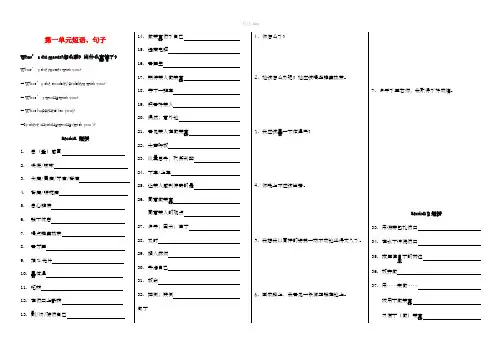
第一单元短语、句子What’ s the matter?怎么啦?出什么事情了?What’ s the matter with you?= What’s the trouble/problem with you?= What’ s wrong with you?= What happened (to you)?=Is there anything wrong (with you )?Section 短语1.患(重)感冒2.发烧/咳嗽3.头痛/胃痛/牙痛/背痛4.背痛/喉咙痛5.患心脏病6.躺下休息7.喝点蜂蜜热茶8.看牙医9.拍X光片10.量体温11.吃药12.在伤口上敷药13.割/切/擦伤自己14.做某事伤了自己15.远离电脑16.看医生17.期待某人做某事18.等下一班车19.照看好某人20.偶然;意外地21.看见某人在做某事22.大声呼救23.认真思考;权衡利弊24.下车/上车25.让某人感到惊奇的是26.同意做某事同意某人的观点27.多亏;因为;由于28.及时29.陷入麻烦30.考虑自己31.救命32.摔倒;跌倒句子1、你怎么了?2、她该怎么办呢?她应该喝些蜂蜜热茶。
3、我应该量一下体温吗?4、你晚上不应该出去。
5、我想我以同样的姿势一动不动地坐得太久了。
6、回家路上,我看见一条狗正躺在地上。
7、多亏了王老师,我取得了好成绩。
Section B短语33.用绷带包扎伤口34.在水下冲洗伤口35.按压住鼻子的两边36.放弃做37.用……来做……被用于做某事习惯于(做)某事38.让自己活得自在39.休息几天40.在烈日下41.感觉病了/感到不舒服42.划伤了膝盖43.流鼻血44.伤了背45.碰了头46.晒伤47.呼吸有问题48.被球打/碰了49.爬山(活动)50.去爬山51.对……有兴趣52.冒险53.失去生命54.因为55.亲自;独自56.(主语为物)耗尽;用光(主语为人)耗尽;用光57.准备做某事58.切掉他一半右臂59.失血太多60.左右为难;进退两难61.在困难的情况下62.摆脱;脱离63.学好英语的重要性64.做出好决定65.掌控一生66.坚持爬山67.活着还是死亡68.发生事故69.放弃做句子1、他在学习英语方面有困难。
人教新目标八年级英语下册语法讲义:Unit1What'sthematter?
Unit 1What's the matter?1.I have a stomachache.我胃痛。
(1)stomachache为可数名词,意为“胃痛;腹痛”。
在英语中,一部分表示身体部位的名词加上名词ache(疼痛),可以构成合成名词。
如:headache头疼;toothache牙痛;backache背痛。
(2)have a+以上合成名词,表示“……痛”。
如:Mary didn't come to school yesterday because she had a stomachache.昨天玛丽因为胃痛没来上学。
2.drink some hot tea with honey喝一些加蜂蜜的热茶(1)with作介词,意为“具有;带有”,表示某物带有或具有某种特征。
如:She is a girl with big eyes.她是一个大眼睛女孩。
(2)反义词为without,意为“没有”。
如:I think I sat in the same way for too long without moving.我想我保持同一个姿势一动不动地坐太久了。
3.see sb. do sth.和see sb. doing sth.的区别(1)see sb. do sth. 意为“看见某人做某事”(看到动作发生的全过程或经常看到动作发生)。
如:I often see him play basketball on the playground.我经常看见他在操场上打篮球。
(2)see sb. doing sth. 意为“看见某人正在做某事”(强调动作正在发生)。
如:I saw him playing basketball on the playground just now.刚才我看见他正在操场上打篮球。
八年级英语下册 Unit 1 What’s the matter知识点总结、作文 (新版)人教新目标
What’s the matter1.What’s the matter?= What’s the trouble?=What’s wrong? 怎么了?(wrong 错误的,有毛病的)2.What’s the matter with you? 你怎么了?What’s the trouble with her? 她怎么了?What’s wrong with the computer? 电脑怎么了?感冒发烧咳嗽头疼胃疼,肚子疼牙疼背疼,腰疼背疼,腰疼喉咙痛脖子疼腿疼疼; 使……受伤My head hurts. = I have a headache. 我头疼。
I hurt my leg. 我伤到了腿。
You hurt my heart/feelings. 你伤了我的心/感情。
5.He has a bad/terrible cold. 他得了重感冒。
He has a high fever. 他发高烧。
6.with prep. 用We look with our eyes. 我们用眼睛看。
Don't write with a pencil. 别用铅笔。
7.lie v. 躺;撒谎;位于n. 谎言 tell lies 撒谎A boy is lying on the grass. (lie - lying)Don't lie. = Don’t tell lies. 别撒谎。
Shandong lies in the east of China.山东位于中国东部。
8.休息一下 have a rest = have a break=take a rest =take a break9.carry 运,搬,提,背He is carrying a big bag his back.他背着一个大包。
10.There is something wrong with………有毛病。
11.There is nothing wrong with………没毛病。
人教版八年级英语下册Unit 1—2 必背短语及句子
Unit 1 what’s the matter?必背词组1. have/get a headache =headache hurts头痛2. have/get a stomachache= stomachache hurts胃痛3. have/get a toothache = toothache hurts牙痛4. have/get a very sore throat = throat hurts a lot喉咙痛5. have/get a sore back = back hurts背痛6. have/get a sore leg = leg hurts腿痛(伤)7. have a fever发烧8. have colds =have a cold感冒9. have a nosebleed流鼻血10. have a cough咳嗽11. have a heart problem心脏病12. have the same spirit as Aron和Aron有一样的精神13. had a serious mountain climbing accident遇到了严重的登山事故14. get into trouble遇到麻烦15. get hit on the head撞到了头16. get out of….从……出来;远离……lie down and rest躺下休息17. rest for a few days休息几天18. have a rest = take a rest进行休息19. have a break=take a break (短暂的)休息20. get some sleep睡觉21. get some rest休息22. expected most or all of the passengers to get off and wait for the next bus. 期待绝大多数或全部的乘客下车去等下一班车23. see a dentist and get an X-ray去看牙医并照片24. drink some hot tea with honey喝加了蜜的热茶25. take one’s temperature给某量体温26. take good care of myself好好照顾自己27. take the man to the hospital把这个人送到医院28. move the man to onto the bus把这个人般到公共汽车上29. need to take breaks away from the computer有必要不沾计算机一段时间30. put some medicine on the cut在伤口上敷药31. put a bandage on the finger把创可贴绷在手指上32. put your head back把头往后仰33. put on my jacket穿上我的夹克34. move my neck转动我的颈子35. played computer games all weekend整个周末都玩电脑游戏36. stopped the bus without thinking twice没有细想就停了车37. stop the blood止血38. hurt yourself playing soccer在踢足球时伤了你自己39. found himself in a very dangerous situation when climbing in Utah.在犹他州爬山时发现自己处于非常危险的景地40. cut myself by accident偶然砍伤了我自己41. have to act quickly必须赶快行动42. thanks to Mr. Wang and the passengers多亏了王先生和乘客们43. saved the man in time及时救了这个人的命44. an American man who is interested in mountainclimbing一个对爬山感兴趣的美国人45. one of the exciting things刺激的事情之一46. almost lost his life because of accidents因为事故几乎失去了他的生命47. climbed down the mountain下山48. the importance of making good decisions作好决定的重要性49. be in control of one’s life把握生命50. make a decision that could mean life or death做出生死抉择51. Aron ran out of water.= Aron’s water ran out. Aron喝光了水52. ate too much junk food at my friend’s birthdayparty在朋友的生日party上吃了太多垃圾食品53. to one’s surprise,…令某人吃惊的是……54. agreed to go with him同意和他一起去55. hit an old man撞到一个老人56. right away立刻,马上57. right now刚才58. fall down 倒下,摔倒59. run it under water用水冲60. tell of/about…讲述……61. still go mountain climbing依然去爬山62. doesn’t mind taking risks不介意冒险63. give up放弃64. an all-you-can-eat meal所有东西都好吃的一餐65. run under the hot sun在毒辣的太阳下跑66. be used to doing something习惯于做……必背句子1. What’s the matter( with you)?=What’s wrong( with you)?=What is happening (to you)?怎么了?2. What should I do?我应该做什么呢?/我该怎么办呢?3. Should I take my temperature? No, you shouldn’t. /Yes, youshould.我应该测量体温吗?不,你不应该。
2020年春人教新目标英语八年级下册 Unit1 单元知识点总结全解
2020年春人教新目标英语八年级下册Unit1 What's the matter?一常用短语及重点句型。
(一)常用短语:1. have a fever / cough / cold 发烧/咳嗽/受凉;感冒2. have a toothache / stomachache 牙疼/胃疼3. have a sore back / throat 背疼/喉咙痛4. talk too much 说得太多5. drink enough water 喝足够的水6. take risks (take a risk) 冒险7. in a difficult situation 在困境中8. give up 放弃9. make a decision 做出决定10. lie down and rest 躺下来休息11. hot tea with honey 加蜂蜜的热茶12. see a dentist 看牙医13. get an X-ray 拍X 光片14. take one’s temperature 量体温15. put some medicine on sth. 在……上面敷药16. feel very hot 感到很热17. sound like 听起来像18. all weekend 整个周末19. in the same way 以同样的方式20. go to a doctor 看医生21. go along 沿着……走22. on the side of the road 在马路边23. shout for help 大声呼救24. without thinking twice 没有多想25. get off 下车26. have a heart problem 有心脏病27. to one’ s surprise 使……惊讶的;出乎……意料28. thanks to 多亏了;由于29. in time 及时30. save a life 挽救生命31. get into trouble 造成麻烦(或烦恼)32. right away 立刻;马上33. because of 由于34. get out of 离开;从……出来35. hurt oneself 受伤36. put a bandage on sth. 用绷带包扎37. fall down 摔倒38. feel sick 感到恶心39. have a nosebleed 流鼻血40. cut his knee 割伤他的膝盖41. put her head back 把她的头向后仰42. have problems breathing 呼吸困难43. mountain climbing 登山运动44. be used to doing sth. 习惯做某事45. run out (of) 用完;耗尽46. so that 以便47. so … that 如此……以至于……48. be in control of 掌管;管理49. keep on doing sth. 继续或坚持做某事(中间无间隔)keep(sb)doing sth (让某人)持续做某事(中间无间隔)50 get hit/sunburned 被打击/晒伤51 see sb. doing sth.看见某人正在做某事52 see sb do sth 看见某人做了某事。
- 1、下载文档前请自行甄别文档内容的完整性,平台不提供额外的编辑、内容补充、找答案等附加服务。
- 2、"仅部分预览"的文档,不可在线预览部分如存在完整性等问题,可反馈申请退款(可完整预览的文档不适用该条件!)。
- 3、如文档侵犯您的权益,请联系客服反馈,我们会尽快为您处理(人工客服工作时间:9:00-18:30)。
Unit 1 What’s the matter一、必背短语Section A 部分1.患感冒have a cold2.胃痛have a stomachache3.喉咙痛have a sore throat4.背痛have a sore back5.躺下休息lie down and rest6.量体温take one’s temperature7.说得太多talk too much8.休息take breaks/a break9.下车get off 10.拍X光片get an X-ray11.看见某人正在做.. see sb. doing 12.反复考虑think twice13.期待某人去做某事expect sb. to do 14.使…惊讶的to one’s surprise15.同意做某事agree to do sth. 16.及时in time17.多亏,由于thanks to 18.陷入困境;惹麻烦get into troubleSection B 部分1.休息几天rest for a few days2.把…放下;低下put…down3.告诉某人做某事tell sb. to do4.告诉某人不要去做tell sb. not to do5.做某事有问题/麻烦/困难have problems/trouble/difficulty (in) doing sth6.对…感兴趣be interested in7.习惯于做某事be used to doing sth8.过去常常做某事used to do sth 9.冒险take risks/a risk10.由于/因为+n./pron. because of 11.处于险境in a dangerous situation13.用尽,耗光run out (of)12.处于困境in a difficultsituation14.准备/乐于做某事be ready to do 15.切除cut off16.如此…以至于…so…that…17.以便于;为了so that/in order that18.离开;从..出来get out of 19.做决定make decisions/a decision 20.掌控,管理be in control of 21….的重要性the importance of…22.放弃give up 23.用绷带包扎put a bandage on…24.继续做某事keep on doing 25.似乎/好像做某事seem to do【教材内容解析】Section A1.What’s the matter? (P. 1)What’s the matter意为“怎么了?出什么事了?”,常用来询问对方遇到什么麻烦或者有什么不顺心的事,后接with sb./sth.表示“某人/某物怎么了”。
可以表示“你怎么了?”的句子有:(1). _____________________________________________(2). _____________________________________________(3)._____________________________________________(4). _____________________________________________(5). _____________________________________________(6). _____________________________________________2.I have a stomachache. (P. 1)stomachache用作名词,表示“胃疼、腹疼”,是一个复合名词,含有后缀ache的常见复合词还有:头痛 ______________;牙痛_________________;耳痛 ________________3.have a sore throat (P. 1)sore是形容词,意为“疼痛的,酸痛的”可作定语或表语。
常见短语:喉咙痛:_______________________后背痛:_______________________4.lie down and rest. (P. 2)(1). lie down意为“躺下”。
【拓展1】lie用作动词可以表示“躺”或者“位于”,还可以表示“撒谎”。
She is lying in bed with a bad cold. 英译汉_________________________________Beijing lies in the north of China. 英译汉__________________________________It is a bad habit to lie. 英译汉___________________________________________【拓展2】lie及lay一词多义原形过去式过去分词现在分词lie(躺、位于)lay lain lyinglie(撒谎)lied lied lyinglay(放置、下蛋)laid(laid laying记忆口诀:规则撒谎,不规则躺;躺过下蛋,下蛋不规则。
(2). rest此处用作动词,表示“休息”,rest也可以用作名词,表示“休息”,常用的短语为“休息”:_______________________.例句:Let’s stop working and have a rest.5.Maybe you have a fever...(P. 2)maybe作副词,表示“可能、也许”,常常放在句首,相当于perhaps,可以与may be相互转换。
Maybe he is a foreigner.=He may be a foreigner.6.You need to take breaks away from the computer. (P. 2)need作动词时,不仅可以作情态动词,还可以作实义动词,作情态动词时,后接动词原形;作实义动词时,后接名词或者动词不定式(to do)作宾语。
You need n’t go to the meeting too early.判断划线词性()A.情态动词; B.实义动词We need three more workers. 判断划线词性()A.情态动词; B.实义动词He doesn’t need to worry too much. 判断划线词性()A.情态动词; B.实义动词7.Yeah, I think I sat in the same way for too long without moving. (P.without用作介词,表示“无、没有”,后接名词、代词或者动名词,反义词是with。
They left ___________ (with) saying goodbye. (用所给词的正确形式填空)We can’t live __________(with) air and water. (用所给词的正确形式填空)8.If your head and neck still hurt tomorrow, then go to a doctor. (P. 2)本句是含有if引导的条件状语从句的主从复合句,可遵循三条原则:(1).主将从现:即主句用一般将来时态,从句用一般现在时态。
(2).主祈从现:即主句为祈使句,从句用一般现在时态。
(3).主情从现:即主句含有情态动词,从句用一般现在时态。
翻译句子:如果明天下雨,我将不会去公园。
__________________________________________________翻译句子:如果明天不下雨,我们会去野餐。
__________________________________________________翻译句子:如果你不擅长英语,你可以向老师寻求帮助。
__________________________________________________9....when the driver saw an old man lying on the side of the road. (P. 3)(1). see sb. doing sth.看见某人正在做某事,强调所看到的动作正在进行。
翻译:I saw her dancing in the park at six yesterday.(2). see sb do sth 看到某人做了或经常做某事。
翻译:I often see her dance in the park.10.The bus driver...stopped the bus without thinking twice. (P. 3)(1). think twice意为“再三考虑、权衡利弊”。
翻译:You should think twice before you make the final decision.【拓展】think的相关短语think about 思考、考虑;think of 想起、认为;think over 仔细考虑11.He got off and asked the woman what happened. (P. 3)(1). get off意为“下车”,反义词是get on“上车”。
翻译:Before getting off the bus, you should take care.(2). happen表示“发生”的时候,作不及物动词,常用的结构为:sth. happens to sb.“某人发生了某事”。
翻译:An accident happened to him yesterday and now he lies in hospital.12.Mr. Wang knew he had to act quickly. (P. 3)have to表示“必须、不得不”,强调客观上的必须,must侧重于个人意志和主观上的必须。
翻译:We have to walk home because the car has broken down.翻译:We must study hard.13.He expected most or all of the passengers to get off and wait for the next bus. (P.3)(1)expect的常见用法:① expect to do sth. 期待做某事翻译:The fans are expecting to see the football star.② expect sb. to do sth. 期待某人做某事翻译:The man expects his son to pass the exam successfully.(2) wait的常见用法:①wait for sb./sth.“等待某人或者某事”翻译:We are waiting for the result of the exam.②wait to do sth.“等待做某事”翻译:All the passengers are waiting to get on the bus.③can’t wait to do sth.“迫不及待做某事”翻译:The children can’t wait to rush out after the class is over.14. But to his surprise, they all agreed to go with him. (P. 3)① agree with sb. 同意某人翻译:I can’t agree with you more.② agree to sth. 同意某事翻译:Do you agree to the plan?③ agree on sth. 在某事上达成一致意见翻译:They finally agreed on the design of the bridge.④ agree to do sth. 同意做某事翻译:Her parents don’t agree to marry (嫁) their daughter to the man.15.Thanks to Mr. Wang and the passengers, the man was saved by the doctors in time. (P.3)(1). thanks to表示“多亏、由于”,后接名词或代词,作原因状语,相当于because of。
